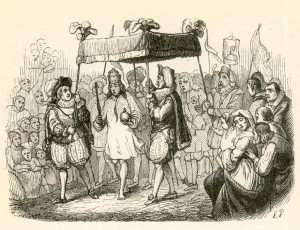The ground shifts under efficient market theorists.
In Hans Christian Andersen’s tale The Emperor’s New Clothes, a pair of confidence tricksters sell the king a suit made of fabric so special, it was invisible…
The more things change, the more they stay the same. For years, the priesthood of academic economics had the entire world convinced that the markets conformed to the “semi-strong” form of the Efficient Markets Hypothesis. Mathematical concepts taught in introductory engineering courses entranced “social scientists” into promoting a tautology that did not conform with even a cursory knowledge of history.
It seems, though, that Efficient Markets Hypothesis might be going the way of the dodo, since it elicits amused smiles from most observers when they hear the name. The Times ran a story this week, Poking Holes in a Theory of Markets, and interviewed the inimitable Jeremy Grantham, whose market views we follow closely. The article’s worth a read if only to get a little bit of a taste of Grantham.
The two bubbles (technology stocks and real-estate) we have suffered this decade have brought into question a number of preconceived notions and assumptions about how the world works. It’s heartening for us to see a resurgence of interest in economists whose work stands apart from the Chicago orthodoxy. It’s good to see a little bit of attention being paid to behavioral economics, Keynes, Schumpeter, and Hayek.
Prices are crucial carriers of information in a capitalist economy, they tell us what the prevailing opinion is in the marketplace. Prices convey to market participants what the odds offered at a racetrack tell bettors. In general the crowd is right about the odds for companies and horses, but on occasion, it is spectacularly, violently, destructively wrong.
Asset prices are useful when they reflect the collective, informed opinion of participants who use independent judgment and analysis to arrive at an independent sense of value. The moment a large enough contingent believes market prices tell them everything there is to know about the world, that there is no purpose in doing their own analysis, and begin to trade indiscriminately, prices become less than useless. Market prices are opinion, and this opinion is meaningful and useful when your market is composed of knowledgeable investors attentive to risk. When the market is taken over by speculators and most participants are too lazy to analyze a security in an intellectually honest way, prices no longer tell you anything but how much punch has been consumed at the party.
Eventually, someone points out that the emperor is naked, and the ground shifts. EMH RIP.
